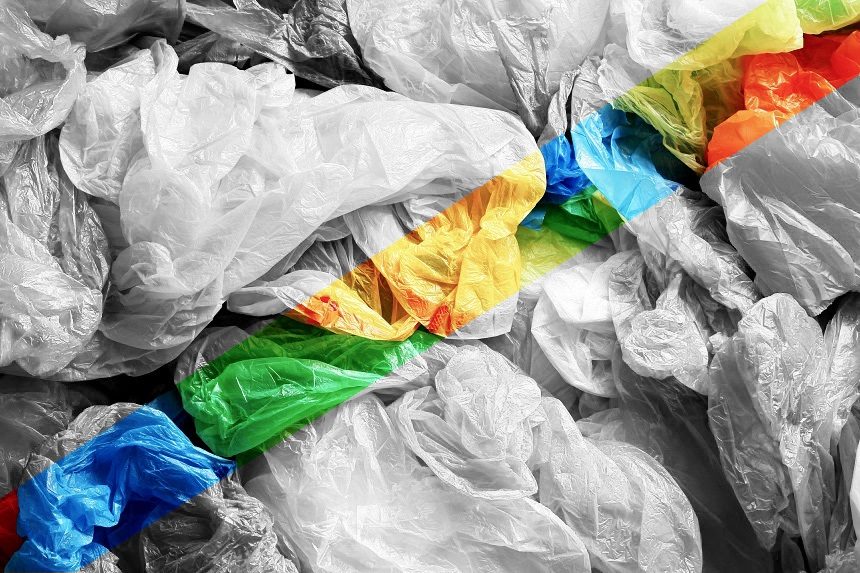The cost of convenience is an island. Or, rather, many islands of floating plastics throughout the Pacific Ocean. Reports of dangerous and toxic ocean litter are a disturbing visual for our mounding plastics problem, but we seem to be at odds for a lasting solution. Taking action against free plastic bags can be a start.
Across the country, a patchwork of laws governs the use of plastic grocery bags. In some states — like California and, soon, New York — consumers must pay extra at checkout to use a more recyclable version of the plastic sack.
But in most states, we’re left to watch as the cashier triple-bags a Vidalia onion. Like an addictive narcotic — we just can’t quit.
Consider this an intervention.
A little more than a week ago, China’s National Development and Reform Commission and the Ministry of Ecology and Environment announced sweeping plans to curb single-use plastics throughout the country. The Chinese government says it will ban “nondegradable plastic bags” in cities by the end of this year and in rural areas by 2022. Twelve years ago, China made its first big move on plastic bag pollution, prohibiting retailers from distributing them for free and outright banning ultra-thin plastic bags.
In America, however, it seems many have accepted the ubiquitous plastic shopping bag as an inevitability. In fact, the journey to single-use plastic dependency in the U.S. has been a relatively short one guided by lobbyists and trade associations.
These urban tumbleweeds have only been drifting around the U.S. since 1979. In 1984, The New York Times covered the “battle of the grocery bags,” calling the paper-or-plastic question “a standoff between the future and the past, the familiar and the chic, the tastes of city dwellers and those of suburbanites.” That year, plastic grocery bags made up only 20 percent of the grocery bag market, but plastics consultants and Mobil representatives were confident that their thin polyethylene bags would soon take over. They were right.
After all, the strategy of the plastics industry since the ’50s has been to promote a throwaway lifestyle counter to the thriftiness of the war years.
Just a few decades after the Times predicted a plastic bag majority, Bangladesh became the first country in the world to pass a thin plastic bag ban. In 2007, San Francisco banned them, sparking municipalities all over the country to start looking at bans and plastic bag taxes.
The backlash from big plastic came swiftly. Groups like the (puzzlingly named) American Progressive Bag Alliance, a division of the Plastics Industry Association, backed efforts against the bans, like state laws prohibiting plastic bag bans and taxes in municipalities. Currently, 14 states have implemented such ban-bans.
The plastics industry argues that their film bags technically can be recycled (a prospect that amuses environmentalists and anyone else familiar with the recycling rates of even easily-recycled items), and they dismiss widespread environmentalist organizing as government overreach or regulation run amok. The problem is, as Naomi Oreskes pointed out to me a few months ago, if an industry or interest can sow confusion on a scientific issue, they can effectively thwart progress. If people aren’t sure that a plastic ban is the way to go, they will likely favor the status quo.
The discourse around what exactly should be done about plastic bags has taken several turns in the last decade or so. In the best possible scenario for plastics interests, it has become an endless left-versus-right debate instead of a critical discussion on how to move forward.
You might remember an episode of Planet Money last year that claimed banning plastic bags could actually be worse for the environment than not. NPR’s Greg Rosalsky cites data that sales in trash bags rise upon banning thin plastic bags. But, as others have pointed out, overall plastic use in the study Rosalsky cites was still a net negative (-70 percent). Even though consumers bought more trash bags than normal, everyone was still using less plastic.
Planet Money, and others, also used fatalist logic (and questionable data) to claim that alternatives to plastic bags have a larger carbon footprint, and therefore might not be worth pursuing. Of course, any reasonable strategy to combat climate change should aim higher than merely curbing the emissions of cotton bag production. The notion that we can’t implement bag bans and taxes without contributing to greenhouse gases is useless contrarianism.
Meanwhile, the frightening discovery of microplastics — and their prevalence in our air, soil, and water — has brought to light the urgency of curbing our rampant plastic use. Since plastic grocery bags are cheap, light, and plentiful, they’re an especially insidious addition to the environment. When they make their way into waterways, light and waves pound them into tiny pieces that end up in our stomachs.
In the Ocean Conservancy’s 2014 International Coastal Cleanup, plastic grocery bags were the seventh most common item found. That means there were six other more-common items, like straws, plastic bottle caps, and cigarette butts. Bans and taxes on disposable plastic bags shouldn’t be seen as unique regulations designed to burden consumers and stomp industry, but rather the salvo of a new age in which we discover, collectively, how to live without single-use plastics.
After all, it’s not such a tall order. We were doing it just a lifetime ago.
Featured image: Shutterstock; edited by Nicholas Gilmore
Become a Saturday Evening Post member and enjoy unlimited access. Subscribe now




Comments
This situation is both a mess and a disaster. Like most man-made, human endeavors the plastic situation got out of control decades ago, with few signs of it lessening to the extent it must for the planet’s survival.
It seems when progress is made in one area, things seem to get worse than ever in others. The re-usable (non-plastic) shopping bags at stores like Trader Joe’s and other markets are one of the bright spots. All 50 states, and every nation around the world has to be on board with this too, on the individual level.
Corporately, new means must be found to combat the problem that will have the corporations remaining profitable while being environmentally responsible. Easier said than done, with continually discarded tech devices being one of the leading contributors to the problem. Ironically, we’re going to need tech to help in solving this massive problem; but again starts with the individual and proper leadership worldwide if there’s ever to be a solution.